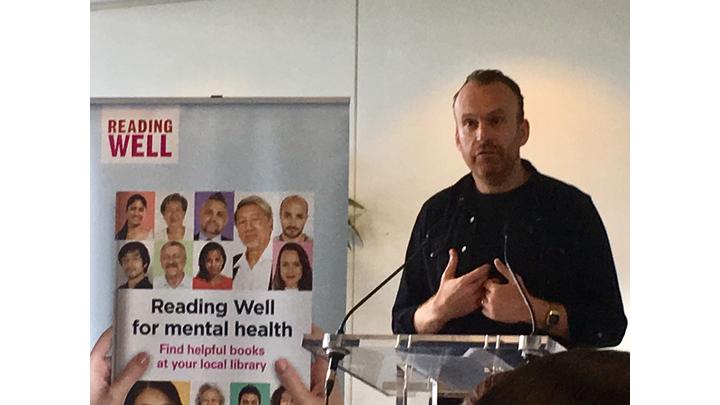Reading Well for Mental Health launch: 5 June
Jun 15, 2018
The contribution of reading and libraries to mental health was centre stage at last Tuesday’s launch of the latest list. Led by the Reading Agency, in partnership with Libraries Connected and the Wellcome Institute, the afternoon’s activities were shared with a wide ranging audience of library, health and reading related organisations and the real power of the Health Offer was very much in evidence.
Imran Khan from the Wellcome Trust kicked off proceedings with an overview of their involvement and the key role which the Health Offer has played in connecting libraries and library services into the work they do.
Sue Wilkinson, Chief Executive of the Reading Agency put into context the partnership that has existed now for some years in bringing together experts from both the reading and literacy sectors and the health and wellbeing sector. These relationships are strong and the support of health providers, professionals and organisations provide a firm basis on which to sell the unique approach of the self-help and books on prescription approaches.
Our Past President, Neil MacInnes and Debbie Hicks from the Reading Agency explained the importance of the offer in providing a consistent, informed and authoritative scheme which can be accessed through all participating libraries across the country.
Gregor Henderson from Public Health England gave an insight into the continuing need to make mental health more visible and to dismiss the stigmas attached to it. His own childhood experiences of living in the grounds of a mental hospital had shown him first hand the negative attitudes to mental illness which are thankfully not so commonplace these days.
Mags Patten from Arts Council England (ACE) and Catherine Wilton from the Coalition for Collaborative Care focused on the national partnerships which have developed and the role of ACE in supporting health and wellbeing through libraries. The recent awarding of NPO status to six library services and to Libraries Connected as a sector support organisation will provide a strong framework to work from in order to reach even more people in future.
In an often emotional event, the most memorable element of the day had to be the thoughts and experiences of those who had used the Health Offer or who had participated in the work to create and include self-help books and materials. Katie Clarke-Day, who had participated in the creation and testing of the latest list explained how the offer had personally changed her life. She was proud to have been part of the team working on the new list as she felt she could ask the questions or make the statements that others couldn’t due to her own personal experience of mental illness.

Matt Haig, author of Reasons to Stay Alive one of the recommended titles, rounded off the afternoon with an insight into his own recovery through both reading and writing. He was initially cynical about the value of reading as a self-help therapy but after trying many avenues to improve his mental health, reading and ultimately, writing became a very personal cure for his challenges.
Julie Oldham, our Health Offer Lead, concluded what was an afternoon of celebration, hope and at times emotion. Perhaps the thought for the afternoon, the success of the scheme could be seen from an unconventional KPI quote:
‘We know the scheme is working because the shelves in that area are messy!’

